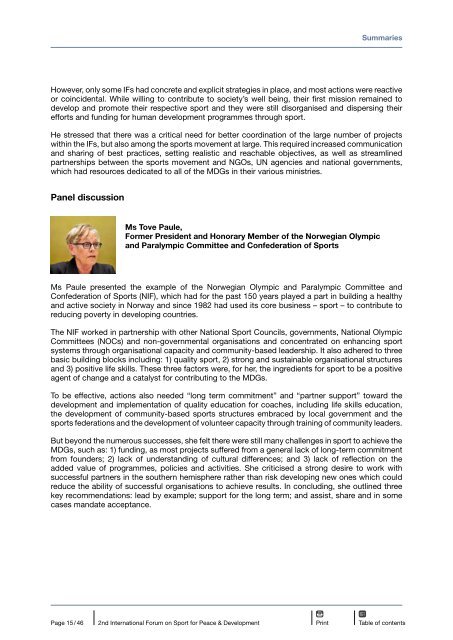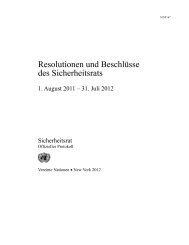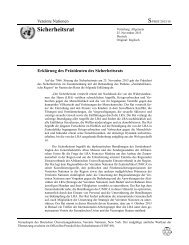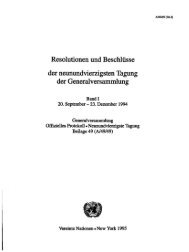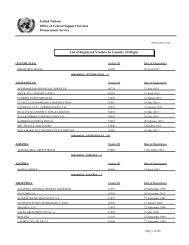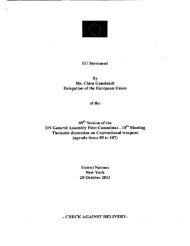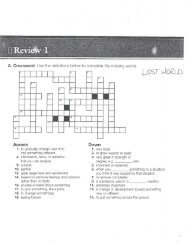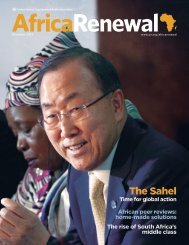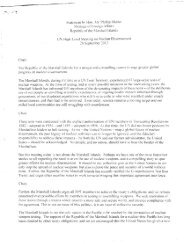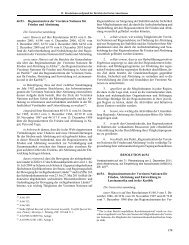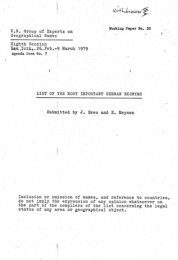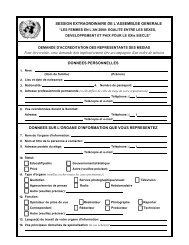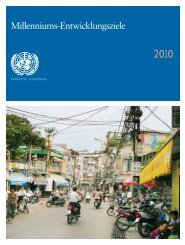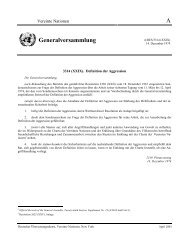2nd International Forum on Sport for Peace - Naciones Unidas
2nd International Forum on Sport for Peace - Naciones Unidas
2nd International Forum on Sport for Peace - Naciones Unidas
Create successful ePaper yourself
Turn your PDF publications into a flip-book with our unique Google optimized e-Paper software.
Page 15 / 46<br />
summaries<br />
However, <strong>on</strong>ly some IFs had c<strong>on</strong>crete and explicit strategies in place, and most acti<strong>on</strong>s were reactive<br />
or coincidental. While willing to c<strong>on</strong>tribute to society’s well being, their first missi<strong>on</strong> remained to<br />
develop and promote their respective sport and they were still disorganised and dispersing their<br />
ef<strong>for</strong>ts and funding <strong>for</strong> human development programmes through sport.<br />
He stressed that there was a critical need <strong>for</strong> better coordinati<strong>on</strong> of the large number of projects<br />
within the IFs, but also am<strong>on</strong>g the sports movement at large. This required increased communicati<strong>on</strong><br />
and sharing of best practices, setting realistic and reachable objectives, as well as streamlined<br />
partnerships between the sports movement and NGOs, UN agencies and nati<strong>on</strong>al governments,<br />
which had resources dedicated to all of the MDGs in their various ministries.<br />
Panel discussi<strong>on</strong><br />
ms Tove Paule,<br />
Former President and h<strong>on</strong>orary member of the Norwegian Olympic<br />
and Paralympic Committee and C<strong>on</strong>federati<strong>on</strong> of sports<br />
Ms Paule presented the example of the Norwegian Olympic and Paralympic Committee and<br />
C<strong>on</strong>federati<strong>on</strong> of <strong>Sport</strong>s (NIF), which had <strong>for</strong> the past 150 years played a part in building a healthy<br />
and active society in Norway and since 1982 had used its core business – sport – to c<strong>on</strong>tribute to<br />
reducing poverty in developing countries.<br />
The NIF worked in partnership with other Nati<strong>on</strong>al <strong>Sport</strong> Councils, governments, Nati<strong>on</strong>al Olympic<br />
Committees (NOCs) and n<strong>on</strong>-governmental organisati<strong>on</strong>s and c<strong>on</strong>centrated <strong>on</strong> enhancing sport<br />
systems through organisati<strong>on</strong>al capacity and community-based leadership. It also adhered to three<br />
basic building blocks including: 1) quality sport, 2) str<strong>on</strong>g and sustainable organisati<strong>on</strong>al structures<br />
and 3) positive life skills. These three factors were, <strong>for</strong> her, the ingredients <strong>for</strong> sport to be a positive<br />
agent of change and a catalyst <strong>for</strong> c<strong>on</strong>tributing to the MDGs.<br />
To be effective, acti<strong>on</strong>s also needed “l<strong>on</strong>g term commitment” and “partner support” toward the<br />
development and implementati<strong>on</strong> of quality educati<strong>on</strong> <strong>for</strong> coaches, including life skills educati<strong>on</strong>,<br />
the development of community-based sports structures embraced by local government and the<br />
sports federati<strong>on</strong>s and the development of volunteer capacity through training of community leaders.<br />
But bey<strong>on</strong>d the numerous successes, she felt there were still many challenges in sport to achieve the<br />
MDGs, such as: 1) funding, as most projects suffered from a general lack of l<strong>on</strong>g-term commitment<br />
from founders; 2) lack of understanding of cultural differences; and 3) lack of reflecti<strong>on</strong> <strong>on</strong> the<br />
added value of programmes, policies and activities. She criticised a str<strong>on</strong>g desire to work with<br />
successful partners in the southern hemisphere rather than risk developing new <strong>on</strong>es which could<br />
reduce the ability of successful organisati<strong>on</strong>s to achieve results. In c<strong>on</strong>cluding, she outlined three<br />
key recommendati<strong>on</strong>s: lead by example; support <strong>for</strong> the l<strong>on</strong>g term; and assist, share and in some<br />
cases mandate acceptance.<br />
<str<strong>on</strong>g>2nd</str<strong>on</strong>g> <str<strong>on</strong>g>Internati<strong>on</strong>al</str<strong>on</strong>g> <str<strong>on</strong>g>Forum</str<strong>on</strong>g> <strong>on</strong> <strong>Sport</strong> <strong>for</strong> <strong>Peace</strong> & Development<br />
Print Table of c<strong>on</strong>tents


